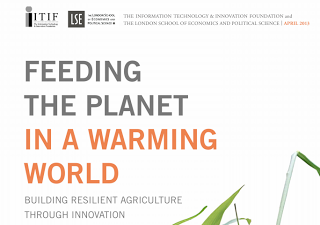

| Visitors Now: | |
| Total Visits: | |
| Total Stories: |

| Story Views | |
| Now: | |
| Last Hour: | |
| Last 24 Hours: | |
| Total: | |
ITIF Report: Feeding the Planet in a Warming World
Monday, April 8, 2013 19:16
% of readers think this story is Fact. Add your two cents.
ITIF Report: Feeding the Planet in a Warming World
Feeding the Planet in a Warming World, a new report by The Information Technology and Innovation Foundation (ITIF) and the London School of Economics (LSE), argues for enhanced investment in research and development of plant and animal genetics and new agricultural practices to address the twin impacts of climate change and population growth on food production.
The world requires more productive crops that have built-in means for withstanding extreme heat, cold, rain and drought, as well as better mechanisms to quickly disseminate these technologies across the globe.
Washington, DC (PRWEB) April 08, 2013
The ever widening effect of climate change on the planet requires the development of comprehensive adaptation strategies that can transform our socio-economic systems to meet this reality. Nowhere is this truer than in agriculture. The world requires game-changing innovation and next generation technologies to address the impacts of climate change, and our exploding population, on global food production.
Feeding the Planet in a Warming World, a new report by The Information Technology and Innovation Foundation (ITIF) and the London School of Economics (LSE), argues that nations must focus on advancing the research and development of plant and animal genetics and new agricultural practices to address this challenge. The authors recommend policy reforms designed to dramatically increase government investment in agricultural research, development and deployment, while also transforming the regulatory framework for and increasing the use of genetically modified (GM) foods.
To view the full report, visit http://www2.itif.org/2013-feeding-planet-warming-world.pdf.
“Climate change is a fact, and we need to focus public policy on adaptation strategies that can mitigate the impacts on systems such as agriculture,” says Matthew Stepp, Senior Policy Analyst with ITIF.
“Our international agricultural innovation infrastructure is grossly underfunded and too focused on near-term challenges and current technologies,” adds Val Giddings, Senior Fellow with ITIF. “The system as it is today will not deliver the agricultural technologies necessary to address the severe climate impacts we will face.”
The report calls for a tripling of global investment in agricultural research and advocates for increased use of genetic research to develop new crop varieties with improved yields and resilience. In addition, governments must strengthen international institutions to serve as renewed hubs for agricultural innovation and dissemination.
“The world requires more productive crops that have built-in means for withstanding extreme heat, cold, rain and drought, as well as better mechanisms to quickly disseminate these technologies across the globe,” notes Mark Caine, Research Fellow with the London School of Economics. “Our policy recommendations will assist in creating the robust, well-funded global innovation infrastructure that is central to achieving this goal.”
The authors also argue the global regulatory framework for agriculture, particularly for genetically modified foods, must be reformed. Many countries ban all uses of GM foods and many more, such as the United States, require unjustified testing and oversight of GM products which increases production costs and delays market access. The authors call for the creation of regulatory standards that focus on the safety and nutritional value of the product—not how it was produced.
“GM foods have been a central factor in increasing food production and decreasing costs over the last three decades, and are as safe as any other type of food,” Giddings says. “By transforming the regulatory framework to meet this reality we can more rapidly develop new agricultural advances and broaden their use globally.”
@ITIF Report: Feeding the Planet in a Warming World:
2013-04-08 19:15:46
Source: http://gmopundit.blogspot.com/2013/04/itif-report-feeding-planet-in-warming.html
Source:



